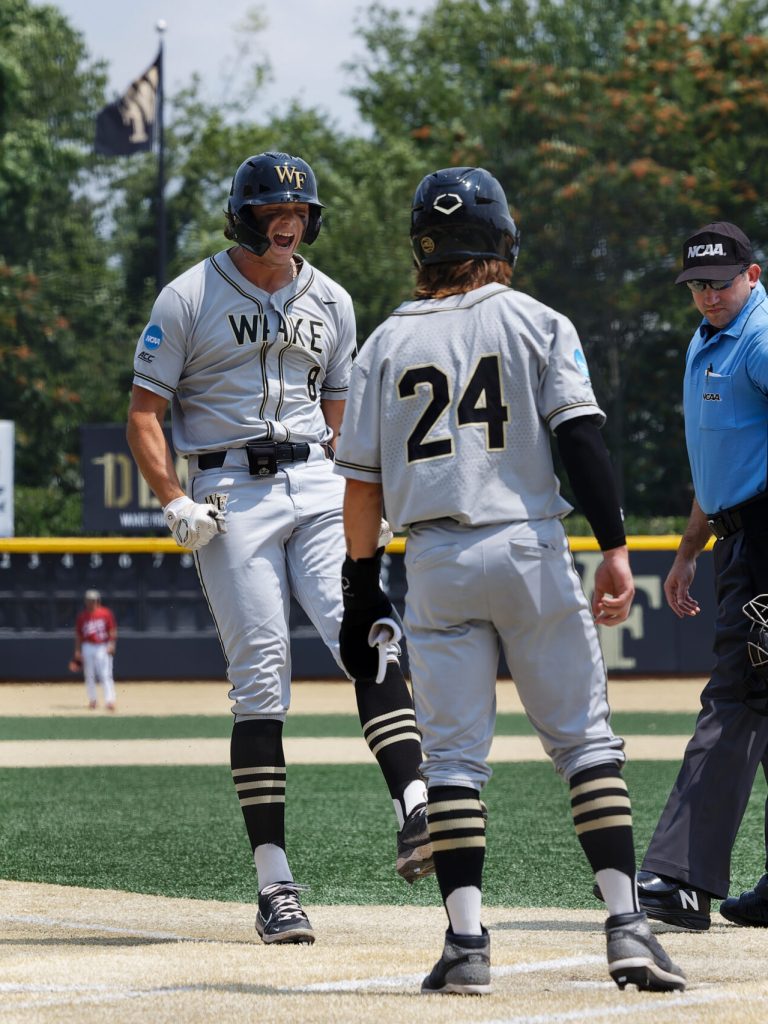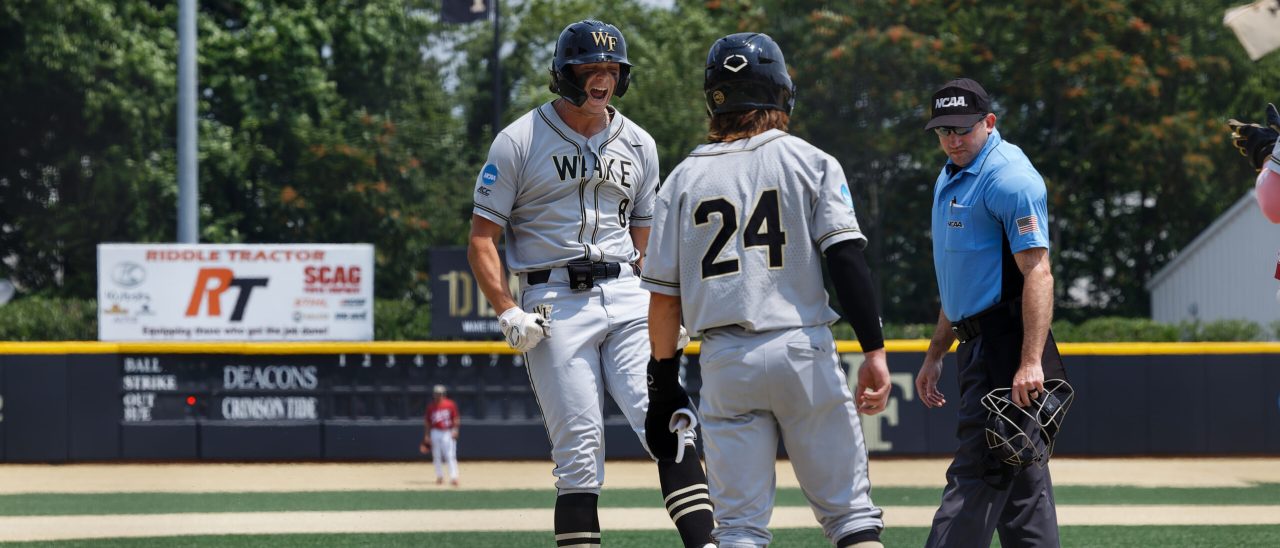Nick Kurtz, JJ Wetherholt Re-Enter Race For No. 1 Pick In 2024 MLB Draft


Image credit: Nick Kurtz (Photo by Eddie Kelly / ProLook Photos)
Charlie Condon and Travis Bazzana both made early-season surges and have used maniacal offensive production to shoot up to the top of BA’s draft board.
Others, including Texas A&M outfielder Braden Montgomery, Florida lefthander and first baseman Jac Caglianone, Wake Forest righthander Chase Burns and Arkansas lefthander Hagen Smith are also top-of-the-class fixtures who are making the 1-1 race compelling.
This weekend only added to the muddled mix of compelling profiles at the top of a wide-open draft class when JJ Wetherholt returned to the lineup for West Virginia and Nick Kurtz went on a home run binge for Wake Forest.
The two players who entered the season in the Nos. 1 and 2 spots on the board are making their presence known once again and reminding the industry why they were so well-regarded in the first place.
Below are detailed notes on both players:
JJ Wetherholt, SS/2B, West Virginia — No. 4
Wetherholt started the season as the top-ranked player in the 2024 draft class, but after the first four games of the season he missed almost two months with a hamstring injury. He returned to West Virginia’s lineup last weekend in a three-game series against Kansas, where he served as a leadoff hitter and DH.
He tallied hits in each game including a three-hit effort on Friday, and in total went 5-for-13 (.385) with a double, four walks and two strikeouts. His timing looked on the money despite his long absence from game at-bats with a number of well-hit balls up the middle, though he is not back to 100% as a runner yet—which explains his DH status and lack of full-effort runs in each game.
Below are breakdowns of all 17 of Wetherholt’s plate appearances during the weekend.
Game 1
1 — 1B. Wetherholt took a pair of 92 mph fastballs out of the zone to get into a 2-0 count. Kansas righthander Reese Dutton tried to get back in the count and put another 92-mph fastball in the zone on the outer third, and Wetherholt turned it around for a sharp ground ball single up the middle. It seemed like he was tracking the ball well out of the hand from the start.
2 — 1B. His second plate appearance against Dutton started with a first-pitch slider at 83 mph that Wetherholt swung at and fouled off about halfway into the left field grass out of play. The next pitch was an 88-mph changeup (tagged a fastball, though I am pretty sure it was a changeup) a tick below middle-middle that Wetherholt again turned around for a single right back up the middle.
3 — BB. Wetherholt has a confident take on a first-pitch fastball that just misses down and in before seeing three consecutive pitches far off the plate that he didn’t need to think much about. It resulted in an easy four-pitch walk, and to this point his swing decisions have been excellent.
4 — F8. This is Wetherholt’s fourth appearance against Dutton, this time in a two-out situation with runners on first and second. Wetherholt comes up swinging against the first pitch—a middle-middle 82-mph slider—but is once again a bit too steep and under the breaking ball. It’s a reasonably well-hit fly ball despite not getting it all and is about 10-15 feet in front of the warning track in center field.
5 — F9 sac fly. His first plate appearance against a non-Dutton arm came in the seventh with one out and runners on first and third. He watches a fastball low and away to get ahead 1-0 but then takes a middle-middle 93-mph fastball for a strike to get back to 1-1. Next, he gets fooled on an 82-mph changeup below the zone but manages to check his swing. 2-1. He then fouls off a fastball up and away at 94 and takes a changeup out of the zone away to work into a full count. The next pitch is another 94 mph fastball in the same zone as previously, but he’s on time and on the barrel for this swing and drives a fly ball to right field just in front of the warning track—easily deep enough for the runner on third to score.
6 — 2B. Another clutch situation for Wetherholt in his sixth PA of the game. It’s the top of the ninth with a runner on first, two outs and the game tied at 10 in a matchup against Kansas righthander Hunter Cranton—who has the best stuff Wetherholt will see all weekend. He holds back on a first-pitch slider on the outer rail that is called a strike but could have easily gone the other way. Down 0-1, Cranton comes back with a filthy 98-mph fastball in the same location that Wetherholt decides too late to swing at and misses to get into an 0-2 count (his first of the game). He takes a ball in the dirt on the next pitch and then flicks his hands at a 98-mph fastball off the outside part of the plate and one-hops the left field wall for an RBI stand-up double. This was his most impressive hit of the weekend working from a pitcher’s count and showing his pure feel for hitting against premium velocity.
Game 2
1 — BB. Wetherholt got into an 0-2 count after watching a fastball for a strike and fouling off an 83-mph slider, but worked his way back with another foul ball and then four straight takes to earn a come-from-behind walk. Most of the balls in this PA were easy takes on pitches well off the zone, though ball four was a stone cold take just off the plate down and in.
2 — K. This is the first plate appearance of the weekend where Wetherholt looked uncomfortable. Kansas RHP Dominic Voegele threw a first-pitch slider on the outer rail to get ahead, then drew a check swing on a nicely spotted 80-mph changeup at the bottom of the zone and buried a slider below the zone in an 0-2 count that Wetherholt attempted to check but was unable to.
3 — 1B. Wetherholt took a breaking ball above the zone to get into a 1-0 hitter’s count and then did a nice job keeping his hands back and driving a 92-mph fastball middle-out back up the middle on a line and slightly to the shortstop side of the second base bag in center field. His balance in the lower half stood out on this swing to me.
4 — 4-3. A pair of fastballs started this AB, the first for a ball and the second for a strike. In a 1-1 count, Wetherholt was out in front and swung and missed against an 83-mph slider middle-away. Then he took a fastball down and in to get to an even 2-2 count and a similar pitch to get to 3-2. Kansas RHP Ethan Lanthier then went up and away with a 96-mph fastball, which Wetherholt rolled over on and grounded a weakly hit ball to second base. There was a brief attempt to run out of the box, but he let up about halfway down the line and jogged slowly through the bag here. It’s probably a routine ground out regardless of health, but Wetherholt is clearly not forcing the issue with his legs yet.
5 — 6-3. This is one of the quickest ABs of the weekend for Wetherholt. He jumped on a first-pitch fastball at 93 mph on the outer rail and hit a ground ball up the middle. It was better contact than his previous groundout but still a routine ground ball that was converted.
Game 3
1 — K. Game three featured a left-on-left matchup for Wetherholt, as Kansas had LHP Evan Shaw on the bump in the Sunday finale. Wetherholt got a 91-mph fastball slightly down and in on the first pitch and got under the pitch, but still hit it home-run distance the opposite way foul down the left field line. I didn’t expect that ball to travel nearly as far as it did off the bat. Down 0-1, Wetherholt had a half-hearted swing on a slider he fouled off, then had a more intentional swing on another breaking ball inside that was also pulled foul. After taking a ball low and away, Wetherholt chased a fastball off the outer rail for strike three.
2 — 4-3. Now facing another righthander, Wetherholt got behind in the count after taking a borderline changeup on the outer rail followed by a fastball in a similar spot that was also borderline and probably off the plate. Instead of being up 2-0, Wetherholt was down 0-2 and was forced to swing at a low and away 83-mph changeup that he grounded out to second base. It was not the best at-bat in the world, but I think his eye was better than the ump’s here, and he showed a willingness to expand in a two-strike count.
3 — IBB. Nothing to report here. With a runner on second and two outs in the third, Kansas just put Wetherholt on first to take the bat out of his hands and create more force-out opportunities.
4 — FC. Wetherholt again gets behind 0-1 on a borderline pitch, this time a 91-mph fastball up and in that could have gone either way. He gets a middle-middle 91-mph fastball on the next pitch that he probably wants back after fouling off to the right field side. He probably should have punished this one, especially with a runner on second and one out. Now in protect mode, Wetherholt fouls off a 92-mph heater above the zone to stay alive, takes a ball inside and then in a 1-2 count, hits a weak chopper against a 92-mph fastball right back at the pitcher. A routine groundout turns into a fielder’s choice and no outs after the pitcher makes a bad throw to third in an attempt to get the advancing runner.
5 — 1B. Another left-on-left matchup here, this time against sidearming LHP Ethan Bradford. Wetherholt gets behind 0-1 after taking a fastball for a strike, evens up the count with a ball up high and then fouls off a 92-mph fastball to the pull side. Down 1-2, Wetherholt gets a 92-mph fastball up and away that he slashes hard on the ground through the 5-6 hole for a base knock and RBI.
6 — BB. Four straight balls in this plate appearance that weren’t particularly close to the plate—including one pitch that sailed behind him. The easiest walk of the weekend for Wetherholt here.
7 — P6. Wetherholt is started out with an 89-mph fastball down and away that he checks at, but manages to hold back on for ball one. Pitch two is another fastball that misses up and away and puts Wetherholt in the driver’s seat up 2-0. He’s hacking when he sees another fastball out of the hand, but is leaking out and a bit in front of an 89-mph heater down in the zone that he gets under and pops out to shallow left field.
In Summary
I thought Wetherholt looked extremely sharp at the plate in his first weekend back. The swing itself looks no different than usual, and he does a nice job getting on plane and making high-quality swing decisions in general. He swung at only four pitches that were clearly out of the zone and each of those swings came in counts where the pitcher was ahead. Wetherholt swung and missed just four times over the weekend (a 15% miss rate) and had no trouble at all with velocity. He did get under a few sliders—and perhaps the lone swing where he looked fooled entirely was a slider down in the dirt—but I expect him to iron that out sooner rather than later with more game reps.
With only seven games under his belt this season, Wetherholt is now hitting .346/.471/.423 with two doubles, an 11.8% strikeout rate and a 20.6% walk rate.
Nick Kurtz, 1B, Wake Forest — No. 8
I was less dialed into Kurtz over the weekend, since he has played many more games and I’ve already put eyes on him in person early this season. Even when Kurtz was not putting up numbers, I was impressed with the quality of his at-bats.
Now the numbers are coming in a big way.
He was one of the hottest hitters in college baseball last week after going 8-for-14 (.571) with six home runs and a double. In his first 12 games of the season, Kurtz was hitting just .262 with a pair of home runs, but since ACC play started on March 8, Kurtz is hitting .333/.525/.1.024 with nine home runs in 13 games.
Entering Tuesday night, he had pushed his season line to .298/.500/.738, which is much more in line with his career numbers at Wake, and if you just isolate conference games, Kurtz was hitting .314/.478/.971—good for a better OPS against conference competition than in each of his first two seasons.
He then went and homered two more times against Coastal Carolina on Tuesday, continuing his torrid pace.
Kurtz hit three home runs in Sunday’s series finale with Virginia Tech and is riding a six-game home run streak that goes back to a March 31 two-homer game against North Carolina. He didn’t cheat himself on any of those home runs over the weekend either:
Kurtz has been homering against velocity and off-speed stuff alike, using the entire field and showing the sort of tremendous raw power that allows him to access the opposite field even when he’s not fully balanced with his lower half or mishitting a ball slightly. It’s easy plus juice paired with an advanced hitting approach that made him a legitimate 1-1 candidate to start the season.
He slipped down draft boards after the first few weeks given a lack of performance, his shoulder injury that caused him to miss a few games and the fact that players like Charlie Condon, Travis Bazzana, Jac Caglianone and Braden Montgomery have been so good out of the gate. Kurtz could still be fighting an uphill battle against that field as the only first baseman of the group, but he certainly has the hit and power combination to stack up with anyone in this class, and that’s starting to make itself obvious once again.

